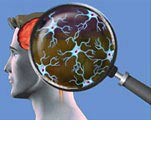
Yesterday I was catching up with my magazine reading at Chapters (the Canadian equivalent of Border) when I came across an ad for a drug ad for bipolar disorder that struck me as slightly different–less euphoric, more cautious to be exact—compared with the ads that have been bandied loosely in all sorts of magazines in the last decade in the US.
The ad was for a drug called Abilify which must be some verbal riff on Ability (no?) and there was a very clear pronouncement on that ad that admitted they had no idea how the drug even worked. It went like this:
“ABILIFY may work by adjusting dopmamine activity instead of completely blocking it and by adjusting serotonin activity. However, the exact way any medicine for bipolar disorder works is unknown.”
I find this interesting because its tone seems to depart from other ads that seem somewhat more confident (or if they were less so, it was probably kept in the fine print). But when I went to the webpage, this caveat was a little harder to find, as it was a few clicks away within a page entitlted The Brain, Bipolar I Disorder, and ABILIFY . It provides a “handy” pictoral representation of what may be going on with your brain with bipolar disorder/treatment. I found the series somewhat odd and amusing, especially the one that used a magnifying glass to “see” all the neurons and nerves or whatever they are in your brain.
update: so you know, the US and New Zealand are the only 2 countries that allow drug direct to consumer advertising so I am not sure what the ad was doing in this magazine. It was American magazine but in Canada. I would think they would make them get rid of ads like that. Anyone know why it can slip through the border like that?



hey biella,
yes a lot of the ads now say “may work by correcting imbalances, but we just don’t know’
to me this is a sophisticated upgrade of the propaganda approach, they get to imply the chemical imbalance theory but not be held accountable to it if someone challenges the science behind it!
electroshock information is the same, they like to say ‘we don’t know how it works.’ the reality is that the way that abilify and ect work is pretty clear. one makes you high like street drugs, the other works in the same way head trauma does. the ads of course never steer you to think about drugs like street drugs or ect like a head injury, for obvious reasons.
the ‘it may work by correcting imbalances but we don’t know’ approach also sort of seals this weird contract btwn doc and pt, like “you are special and participating in a mystery for pragmatic reasons.’ i talk with many people who the ‘they don’t know how it works’ line seems like weird reassurance that something mysterious — and benign and immune to criticism — is going on (when in fact the chemical action of these drugs is pretty well established – they disrupt normal brain chemistry like street drugs do.)
Of course, to me, ‘not knowing’ means more that there are huge risks they are not telling you and that you are being experimented on unethically. For the pharma companies and the docs however, it is a sophisticated way for them to shape patient views the way they want them,
Comment by wiwill hallll hall — October 16, 2006 @ 4:42 am
Seems to me they’re trying to play both sides of the fence. It works but we don’t know why.
Comment by Bobby Capps — January 21, 2008 @ 4:22 pm